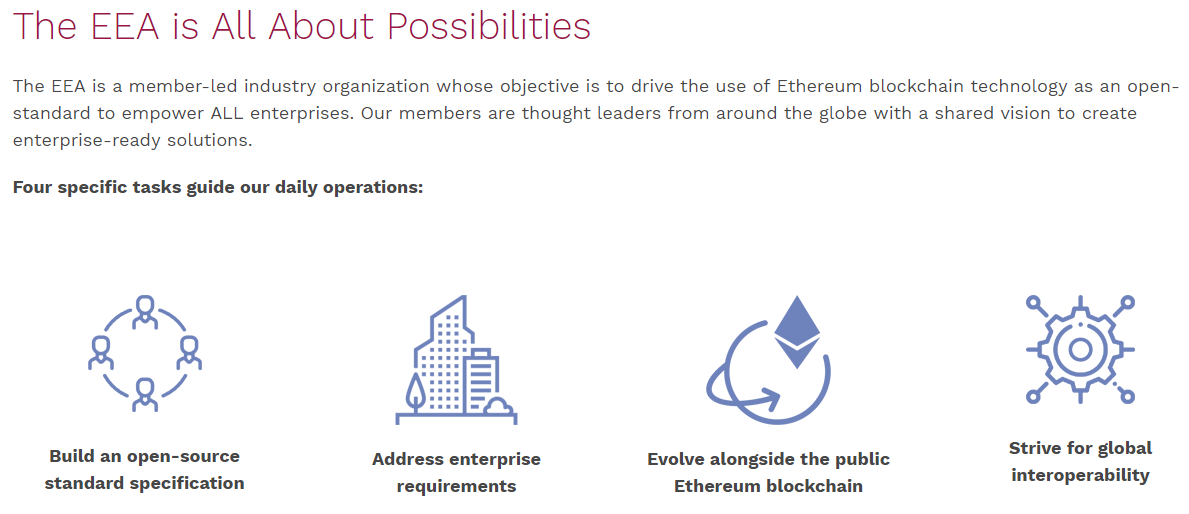In March 2017, various blockchain startups, research groups, and Fortune 500 companies announced the creation of the Enterprise Ethereum Alliance (EEA) with 30 founding members. It aims to customize Ethereum for industry players, and thus boost industrial enterprise blockchain solutions using the open source public Ethereum technology.
In 2018, the alliance has grown to over 200 members, making it the largest open source blockchain initiative in the world. Prominent members include established industry leaders across many sectors of the global economy, such as Microsoft, Intel, Samsung, Cisco, Hewlett Packard, Mastercard, JPMorgan, UBS, Credit Suisse, Banco Santander, BNY Mellon, British Petroleum, Shell, Pfizer, Merck, Deloitte, Accenture, Thomson Reuters, and Toyota, as well as emerging leaders in the new blockchain industry, such as ConsenSys and Oraclize.
The companies working on the Enterprise Ethereum Alliance want to create a private permissioned version of Ethereum that can be rolled out for specific purposes and be open only to certified participants. The purpose of the alliance is to create a standard, open source version of Ethereum that can provide a foundation for any specific industrial use case. For instance, banks could create one blockchain platform for themselves, and shipping companies could create another for their own purposes.
The partners will help each other develop the foundations for different use cases, such as post-trade settlement, payments between banks, and supply-chain tracking, while competing on applications and services built atop the networks:

These private systems aren't likely to require an Ether virtual currency, although the companies are hoping to create modules that will allow users to put in and take out individual elements of Ethereum as they choose.
Many companies have already been working to create their own versions of Ethereum for specific purposes. JPMorgan, for instance, has created a version of Ethereum known as Quorum that the bank has been using in tests to move money between JPMorgan branches in different countries. Quorum will become part of the new private version of Ethereum being developed by the alliance.
The choice of Ethereum as a foundational technology by the members of the alliance confirms the level of credibility it has reached in the world. As the principal blockchain architect at Microsoft put it:
In every industry that we come across, Ethereum is usually the first platform that people go to. Ethereum has this massive advantage of having the public network that has been tested for several years.
In its mission statement, the alliance focuses on several key points of development. These points revolve around the maturity, security, and governance of this new technology, as well as business continuity of established corporate infrastructure. Some modifications need to be made to Ethereum's public blockchain to make it suitable for use in enterprises.
Firstly, integration with existing business processes and IT infrastructure is necessary. This is important because any corporate initiative to build a smart contract platform will have to import rules and transaction history data from existing databases. Most business information currently resides in the existing private databases of large and small companies. This would need to be integrated with the new emerging blockchain technology for the sake of business continuity and sustainability. For example, a bank would need to transfer associated its rules and history of loan recipients before it starts recording transactions and deploying smart contracts on the Ethereum blockchain.
While the Ethereum alliance focuses on the development of private blockchains, the importance of interoperability with the public Ethereum blockchain is also considered. Their vision is for Ethereum's public and private networks to function like the internet and corporate intranets. They will share standard protocols, such as for data storage and transmission, but will have different configurations for privacy and security, depending on each organization's needs.
As a representative from BNY Mellon put it, even if you create private networks, if you can anchor them to public networks, you get an extremely strong set of links together.
Governance and compliance with existing and emerging regulatory frameworks is also a challenge that needs to be addressed by the blockchain community. This is especially important for highly-regulated industries, such as finance. The Enterprise Ethereum Alliance aims to become a governance and standards-setting body for Ethereum enterprise applications. Customizing smart contracts to work in established organizations requires permissions and access levels from different entities. The alliance will design a framework for industry-wide governance and implementation of smart contracts with input from its members.
Continued and accelerated innovation of the Ethereum technology for business is also a major focus point for the alliance. It aims to retain compatibility with and enhance the public Ethereum network. If Ethereum's smart contracts are to reach their promised business potential and change the way we conduct transactions, its public blockchain must include contributions from a diverse set of stakeholders. Familiar frameworks and the standardization of technical requisites will clear roadblocks for developers interested in innovating within the Ethereum ecosystem. The alliance aims to plug in new features based on use cases developed in-house and contribute to Ethereum's roadmap.
In summary, the EEA aims to facilitate and accelerate enterprise adoption of Ethereum-based blockchain technology. The top priorities for the alliance now include ensuring scalability and security.